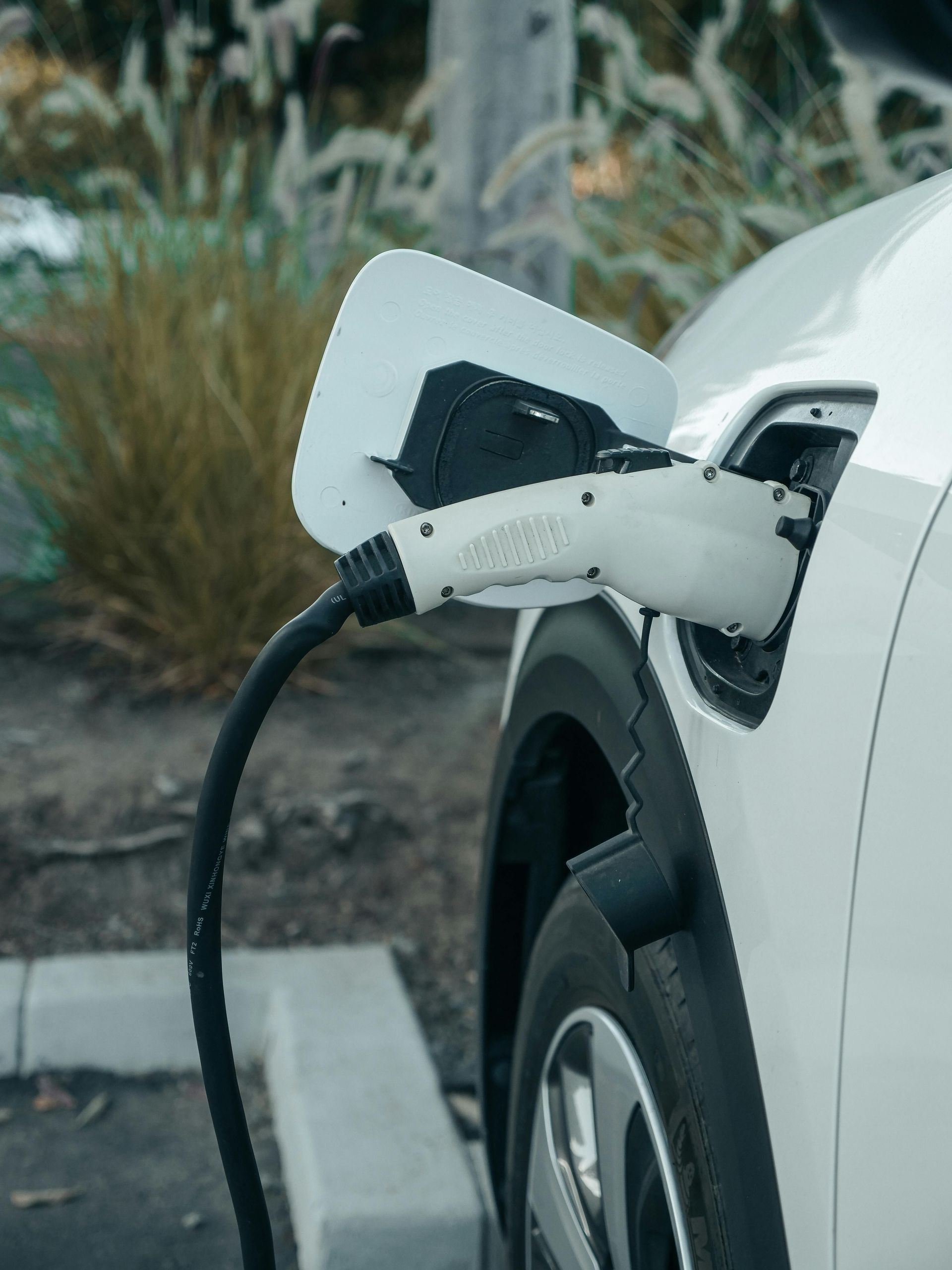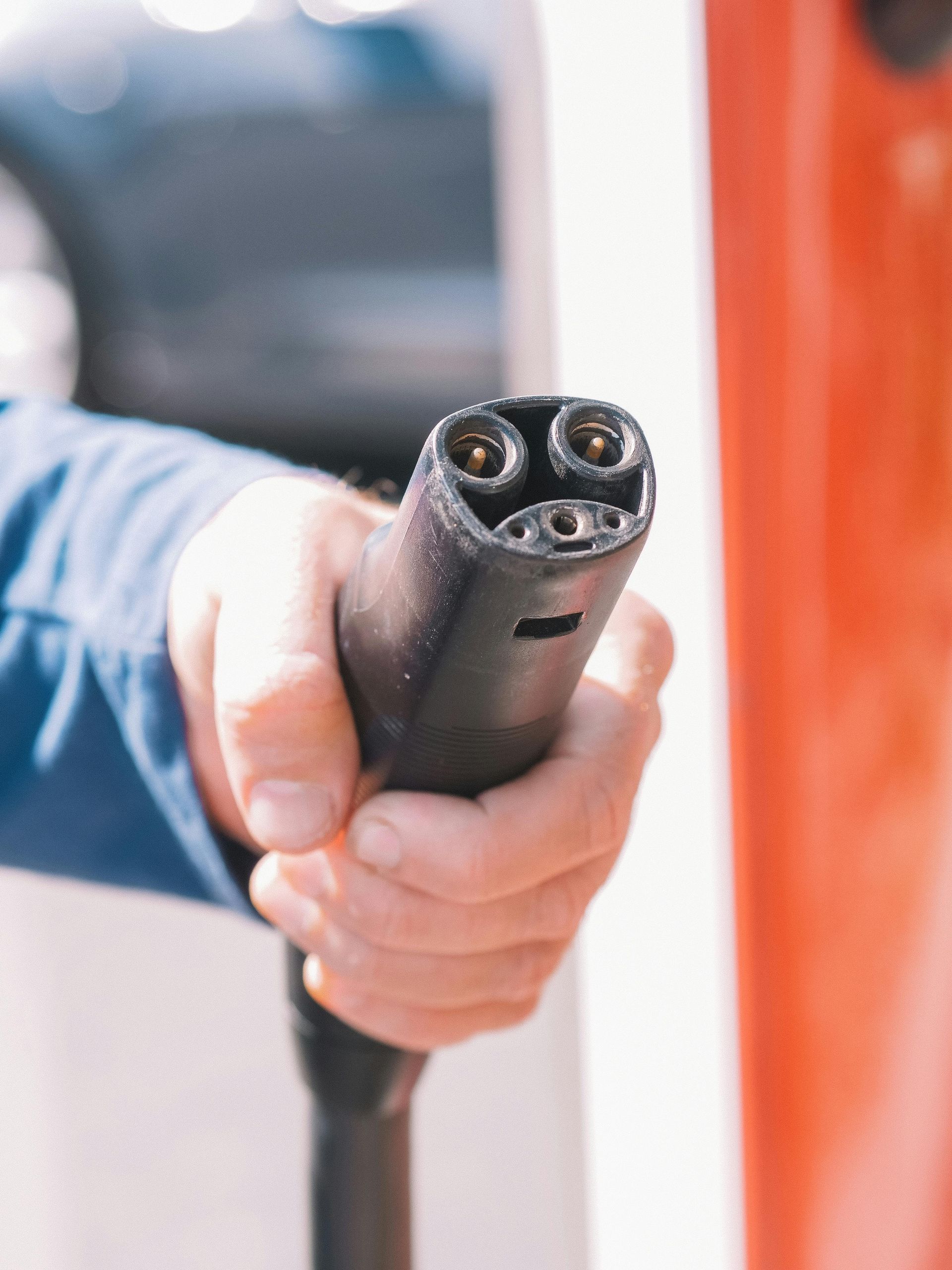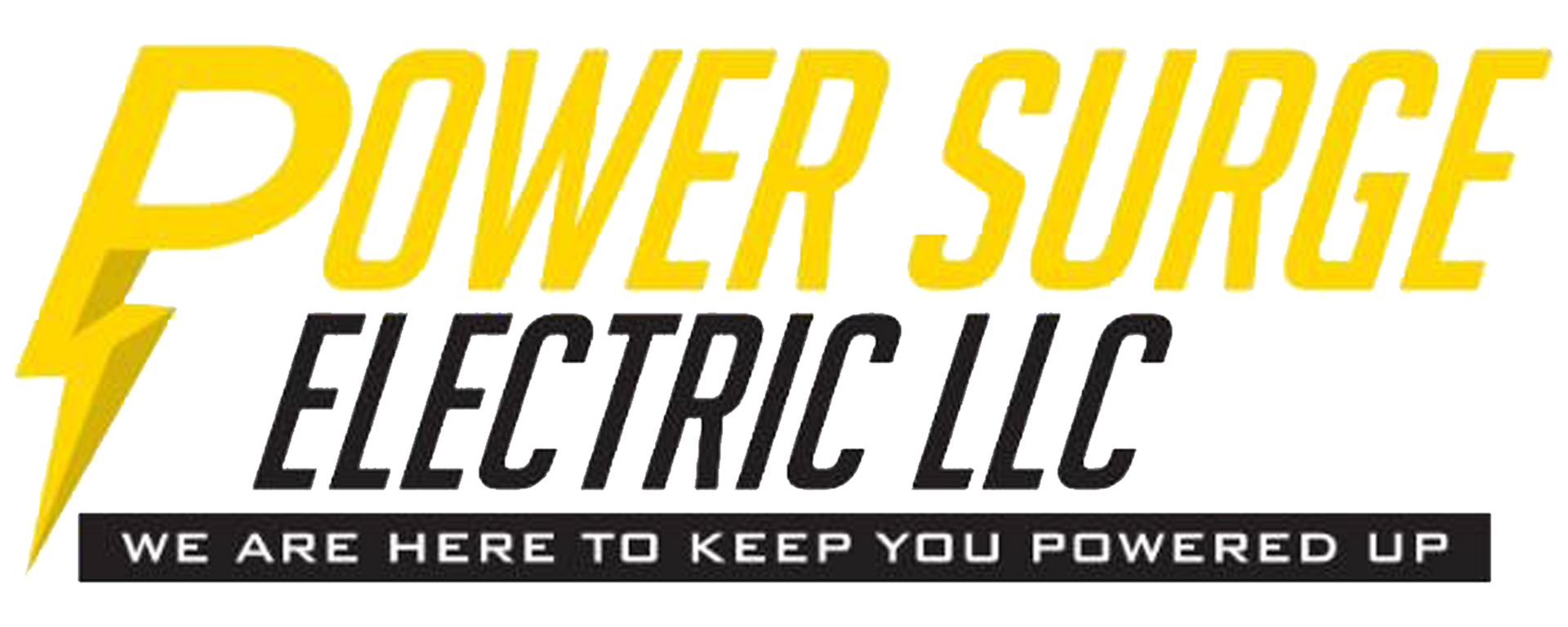EV Plug Services
Charge Your Vehicle with Ease
Install EV Plug in Baytown
Are you ready to power your electric vehicle conveniently at home in Baytown? With Power Surge Electric, LLC, you can have your EV plug installed quickly and efficiently. Picture the satisfaction of charging your car overnight, knowing it's ready to go each morning. Our team specializes in installing EV plugs tailored to your specific vehicle and home requirements. Whether you need a Level 1 or Level 2 charger, we provide a seamless installation process that fits your schedule and budget.
Baytown residents trust us to deliver reliable and safe installations. We handle everything from assessing your electrical system to ensuring your new charger is up and running smoothly. Our experienced electricians are committed to providing top-notch service, ensuring your EV plug is installed to the highest standards. Don't let charging be a hassle—let us make it simple for you.
Secure your EV plug installation today by contacting us.

Choosing to install an EV plug at your Baytown home is a smart move
What to Expect When You Book
Our process is designed to be straightforward and stress-free. From the moment you book with us, you'll know exactly what to expect:
- Initial consultation to assess your needs
- Professional evaluation of your electrical system
- Selection of the right charger type for your vehicle
- Installation using top-quality materials
- Post-installation safety checks and testing
Plan your EV plug installation with us today to enjoy hassle-free charging.
EV Home Charging Guide
Charge at home with confidence
Know before you plug in — we size and install EV charging that fits your home, safely and honestly.

The 30‑second version (plain English)
- What you need: a 240‑volt charger in the spot you park most nights.
- How fast it charges: most homes are great with 32–40 amps (about 25–35 miles of range per hour). Bigger is possible if your home can handle it.
- Can your panel handle it? We check so you don’t overload. If you’re tight on capacity, we can right‑size the charger or add smart load control instead of a full upgrade.
- What it costs (typical): simple outlet installs often $400–$1,000; hardwired chargers usually $800–$2,500. Panel/service upgrades cost more—we’ll only recommend them if you truly need it.
- What we handle: permit, inspection, safe wiring, labeling, and a clean install. Just send 3 photos (panel, parking spot, and path between) to get started.
Why this guide?
Dealers are great at selling cars, but your home’s electrical system is our lane. This page gives you a plain‑English plan so you’re not surprised after you buy the EV. Even if you don’t pick us, you’ll leave knowing exactly what you need and what to ask any electrician.
Quick answers (TL;DR)
- Level 2 home charging uses 240V and typically delivers 25–45 miles of range per hour of charging, depending on your EV and the circuit size.
- Most EV chargers are a continuous load, so we size the circuit at 125% of the charger’s rated current (NEC rule of thumb). Example: a 48A charger requires a 60A breaker.
- 100A/125A services can still work - often with smart load management - but many homes benefit from a panel/service upgrade for comfort, future capacity, and safety.
- Expect your electric bill to increase based on how much you drive. Roughly, 30 miles/day ≈ 9 kWh/day; at common Houston rates, that can be $30–$75/month depending on plan and driving.
- Permits & inspection matter. We pull the permit, perform a load calculation, and make sure your installation meets your local Authority Having Jurisdiction (AHJ) code.
Step 1 — Where will you charge?
Think about the parking spot you’ll actually use most nights:
- Garage (most common): Shortest wire runs, easiest future‑proofing.
- Carport/Driveway: Use outdoor‑rated equipment and weatherproof conduit.
- Apartment/Condo: Often requires HOA/property approval and sometimes a meter‑based solution; we can advise.
Tip: Snap 3–4 photos (panel with door open so we can see breakers, the parking spot, and the path between) and we can rough‑in a plan quickly.
Step 2 — How much charging do you need?
Match your daily driving to a practical circuit size. (Assumes ~0.30 kWh per mile.)
| Charger (EVSE) setting | Circuit breaker | Power (kW) | Approx. miles of range per hour |
|---|---|---|---|
| 16A | 20A | 3.8 kW | ~12–15 mph |
| 24A | 30A | 5.8 kW | ~18–22 mph |
| 32A | 40A | 7.7 kW | ~24–28 mph |
| 40A | 50A | 9.6 kW | ~30–35 mph |
| 48A | 60A | 11.5 kW | ~35–45 mph |
Many households are perfectly happy at 32–40A if they drive under ~50 miles/day. Higher currents are great for big batteries or multiple drivers.
Step 3 — Can your home handle it?
Look at your main breaker rating (often 100A, 125A, 150A, 200A). EV charging is considered continuous, so we keep your system comfortable and within code.
Common scenarios
100A or 125A service
- Likely options: (a) Smart load management that monitors your main and automatically pauses/ramps the EV charger as your home load changes; (b) Right‑size the EVSE (e.g., 24–32A); or (c) Upgrade service/panel to 200A for long‑term headroom.
- Good fit if you don’t run multiple large appliances while charging, or your daily miles are modest.
150A service
- Often supports a 32–40A EVSE without upgrades, depending on AC and appliance load. We confirm with a load calculation.
200A service
- Usually supports 40–48A EVSE comfortably and leaves room for future additions (second EV, hot tub, workshop, etc.).
About the “80% rule”: Individual circuits serving continuous loads are sized so the continuous load ≤ 80% of the breaker rating (equivalently, breaker ≥ 125% of load). Your main service shouldn’t live near its limit for long periods; we run a formal load calc to be sure.
Step 4 — Receptacle vs. hardwired
NEMA 14‑50 receptacle
- Pros: Flexible (portable EVSEs), can be repurposed, lower material cost.
- Cons: In garages/outdoors, code typically requires GFCI protection on the receptacle circuit, which can add cost and may need careful coordination with the EVSE to avoid nuisance trips.
Hardwired EVSE
- Pros: Clean install, often higher current ratings, fewer plug/receptacle wear points, manufacturer GFCI built‑in.
- Cons: Less portable and slightly higher equipment cost.
We’ll walk you through which path fits your car, panel space, and budget.
Safety, permits & code items we handle
- Permit & inspection with your local AHJ (Houston / La Porte / Deer Park / nearby).
- Load calculation per NEC to verify your service capacity with your AC, range, dryer, etc.
- Conductor & breaker sizing at 125% for continuous load.
- GFCI where required (garage/outdoor receptacles); bonding & grounding checked.
- Weatherproofing and correct equipment ratings for outdoor installs.
- Labeling so anyone can understand the system later.
Cost transparency (ballparks — your home may vary)
- NEMA 14‑50 on an open spot, short run: typically $400–$1,000.
- Hardwired 40–60A EVSE, moderate run: typically $800–$2,500 (equipment + install).
- Panel tune‑up or space‑making (tandems, re‑org, minor fixes): $200–$600.
- Panel upgrade (e.g., modern 200A panel): often $1,800–$3,500+ depending on brand/conditions.
- Full service upgrade (meter, mast, weatherhead, utility coordination): often $3,500–$6,500+.
- Smart load‑management device: varies by model; we’ll price if it saves you a service upgrade.
We’ll always provide line‑item pricing and options so you can pick the best value for your situation.
What will it add to my electric bill?
Your bill tracks kWh, and EVs are pretty efficient. A simple estimate: - Daily miles × 0.30 kWh/mile = daily kWh. Example: 30 miles/day ≈ 9 kWh. - Multiply by your plan’s ¢/kWh to estimate daily cost. On many Houston plans, that might be $1–$2.50/day (roughly $30–$75/month) for moderate driving. Heavy nightly charging can be higher. - Time‑of‑use or free‑nights plans may help; we can discuss strategies.
Future‑proofing & add‑ons
- Second EV ready: Run conduit/wire now and cap for later.
- Solar & batteries: We can design the EV circuit so it plays nicely with future PV + storage.
- Generators: We coordinate EV charging with whole‑home standby systems and interlocks so you don’t overload during outages.
- Cable management: Retractors/holsters so cords don’t become trip hazards.
What to look for (even if you don’t choose us)
- Will they pull a permit and provide a load calculation?
- Do they explain circuit sizing (125% rule) and give you options (32A vs 48A, load management, etc.)?
- Are they familiar with GFCI rules for garages/outdoors and how your EVSE handles it?
- Do they provide line‑item pricing and discuss future needs (second EV, solar, generator)?
- Will they provide photos/labels of the finished work for your records?
Our simple process
- Share photos (panel, parking spot, path). We’ll review and discuss goals.
- On‑site visit (if needed) to verify measurements and code items.
- Clear proposal with good/better/best options.
- Permit, install, inspection handled by us.
- Walk‑through & app setup (for smart EVSE), plus care tips.
Plain‑English glossary
- Level 2 charging: Home “fast” charging using 240 volts.
- Continuous load: A device that runs for hours; we size the wiring/breaker a bit bigger for safety.
- Load calculation: The quick math we do to confirm your panel can handle the charger along with AC, oven, etc.
- GFCI: A safety feature that shuts power off in a split second if it senses a ground fault; garages/outdoors need it.
- Hardwired vs. plug‑in: Hardwired = neat, fixed unit with built‑in safety; Plug‑in = uses a 240V outlet (like a NEMA 14‑50) for flexibility.
FAQs
Do I need a 200A service?
Not always. Many 100A/125A homes can charge with a right‑sized EVSE or smart load management. We’ll run the numbers.
Can I share a dryer/range circuit?
Generally no for Level 2. EV charging is continuous; it needs a dedicated circuit.
Can I start with a 14‑50 and upgrade later?
Yes. If we expect you’ll want more current later, we can size conduit/wire now to save future labor.
Will charging every night wear out my panel?
A properly sized and installed circuit is designed for continuous use. That’s why the 125% sizing rule exists.
Do I need Wi‑Fi?
Only for “smart” features. The charger itself will work without it.
Any incentives?
Incentives vary by location and utility plan and change over time. We’ll flag anything you qualify for when we quote.
Ready to plan it right?
Power Surge Electric LLC — your local, safety‑first EV charging team.
- Call/text: (281) 221-9395
- Email: hello@powersurgeelectricllc.com
- Service area: Houston, La Porte, Deer Park & nearby
P.S. If you’re comparing bids, feel free to use our checklist above. We want you to get a safe, code‑compliant install—whoever you pick.
